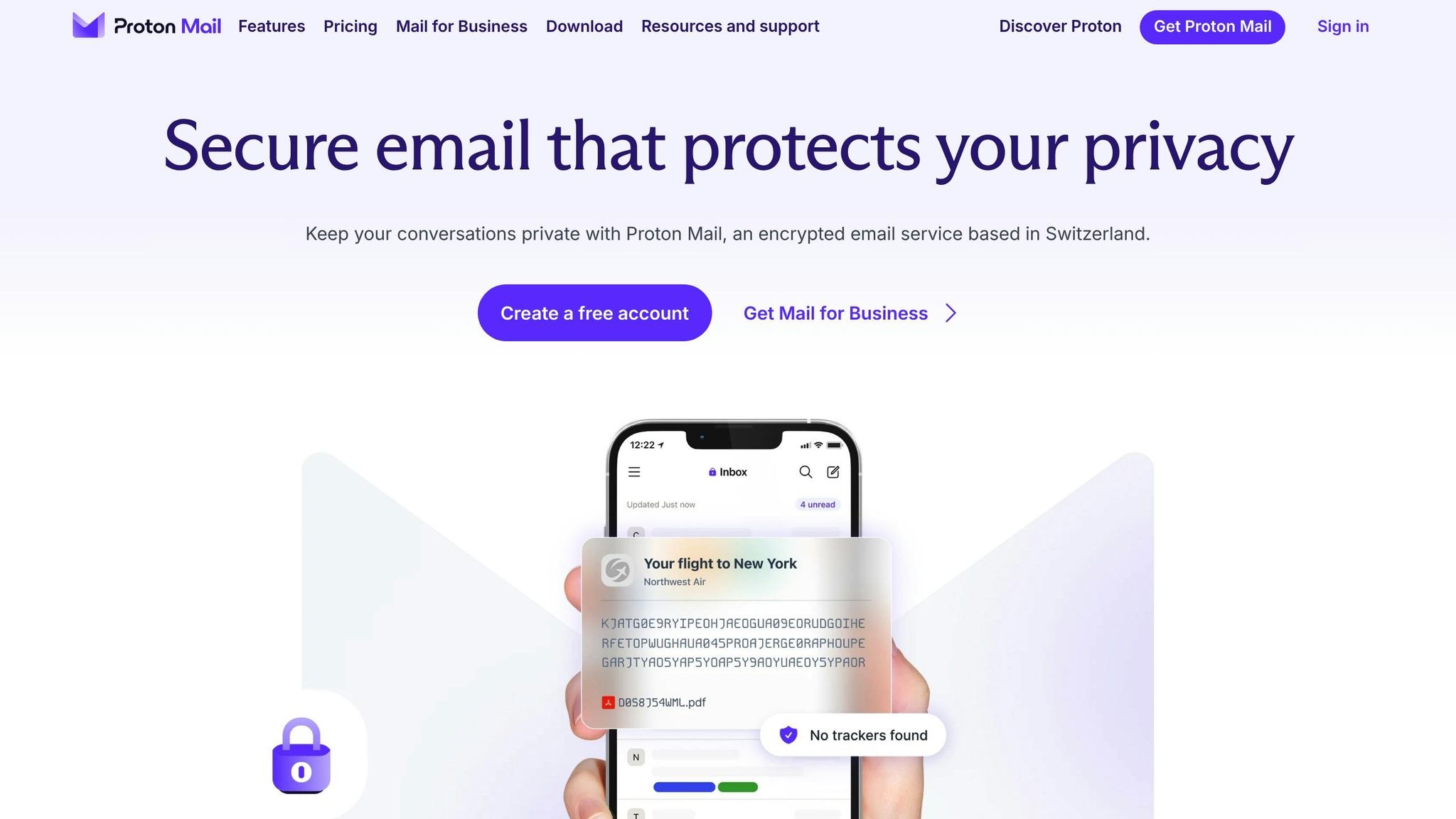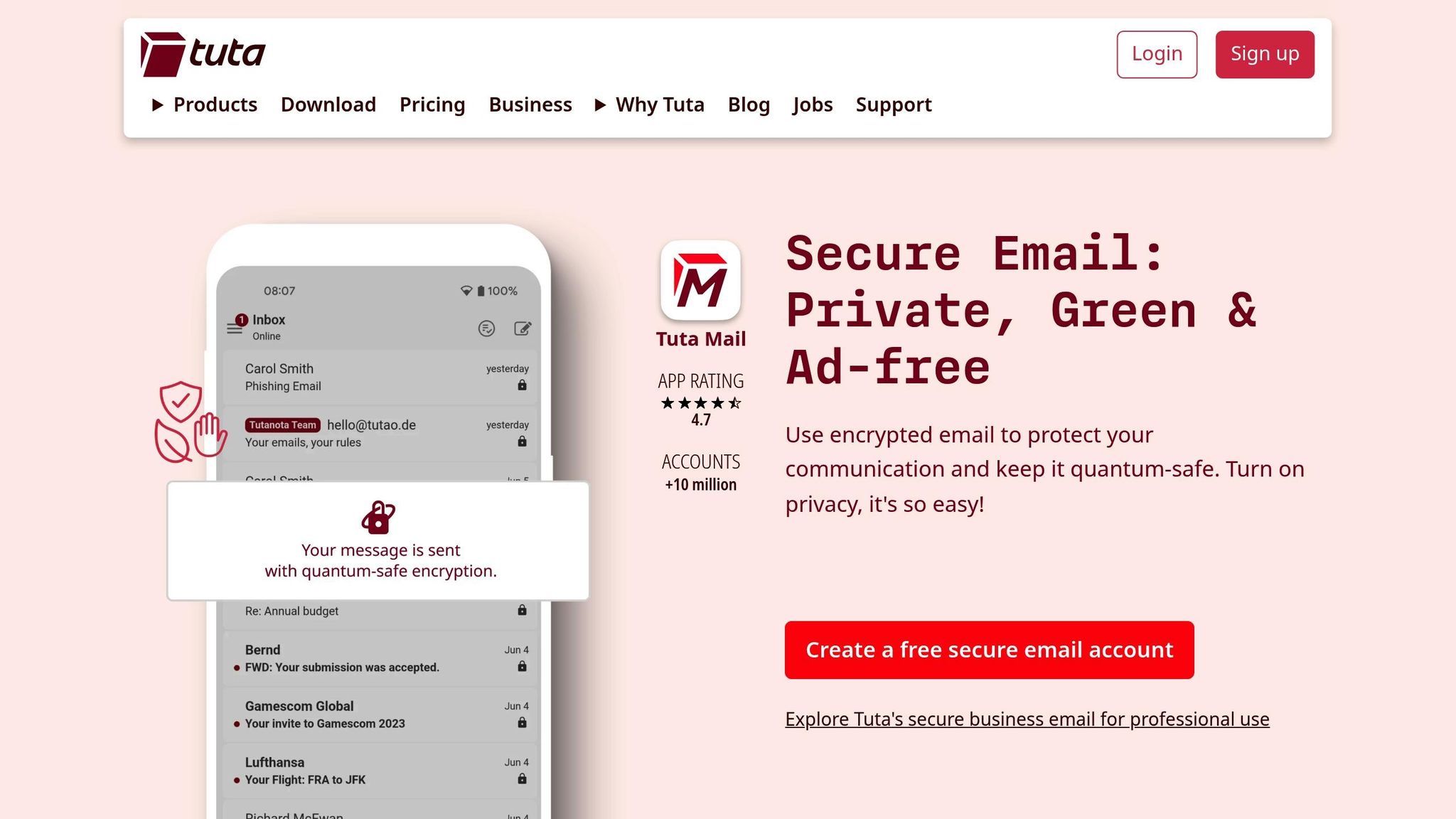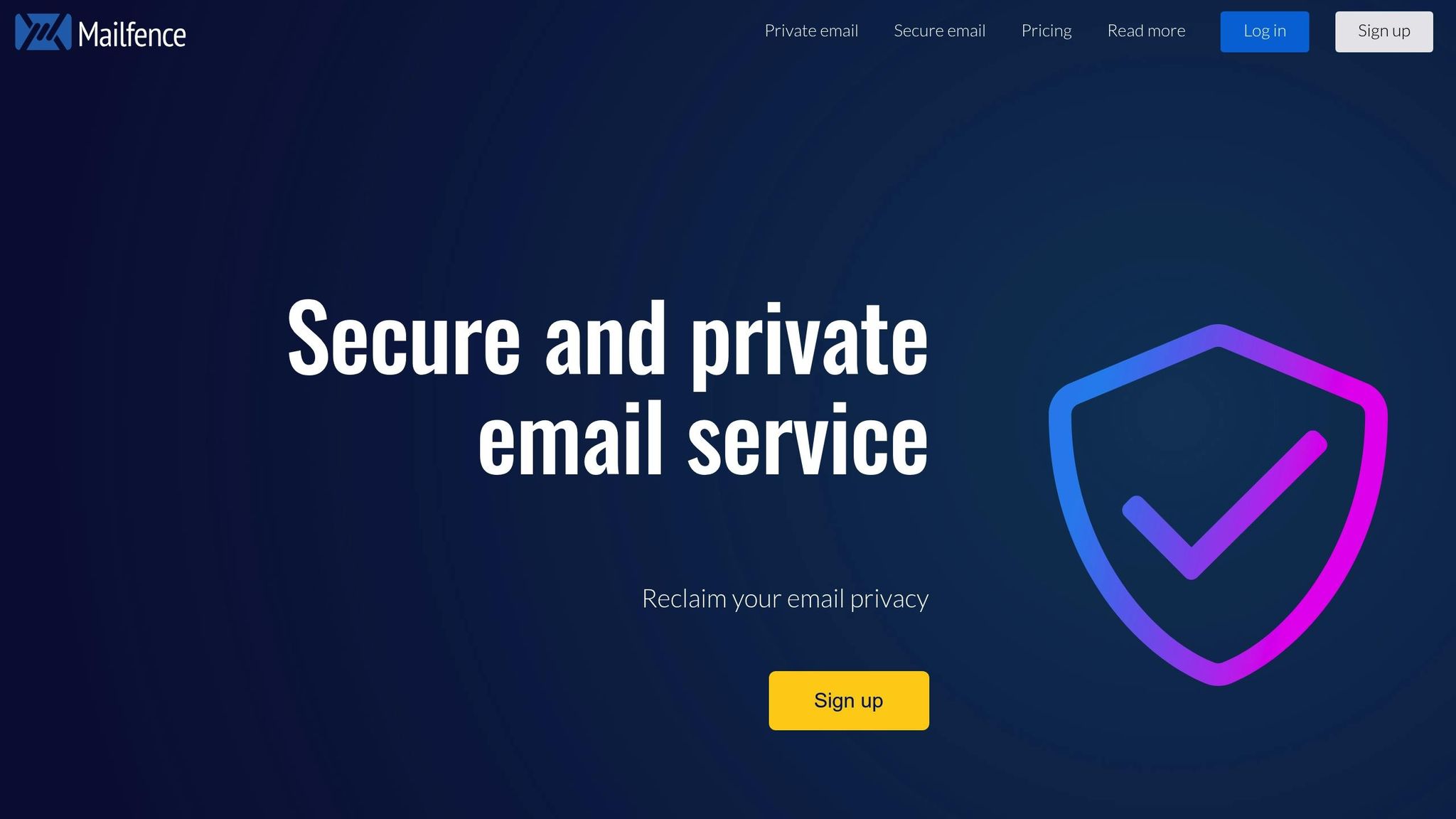Email encryption is critical for small businesses to protect sensitive data and comply with regulations. While Gmail and Outlook offer basic security, they lack robust protection for stored emails and recipient access. Free tools like Proton Mail, Tutanota, Mailfence, and Sendinc provide stronger encryption options without straining your budget. Here's a quick breakdown:
- Proton Mail: Free web and mobile apps with AES-256 encryption; desktop access requires a paid plan.
- Tutanota: End-to-end encryption for emails, contacts, and calendars; limited integration with other tools.
- Mailfence: OpenPGP encryption with strong usability; desktop client support is only available in paid plans.
- Sendinc: Enhances security for existing email setups but lacks detailed technical specifications.
Key takeaway: Choose a tool that balances security, ease of use, and compatibility with your business needs. Start with free plans but plan for upgrades as your business grows.
Which is the BEST Secure Email Option? Let's Compare...
1. Proton Mail

Let’s start with Proton Mail, a popular choice for secure email communication. Proton Mail offers encrypted email services tailored specifically for small businesses. With its free plan, users get access to a web-based interface at account.proton.me, along with dedicated apps for both Android and iPhone.
For desktop users, a 14-day trial of the desktop app is available. However, continued desktop access and integration through Proton Mail Bridge - which enables compatibility with IMAP/SMTP clients like Outlook, Apple Mail, and Thunderbird - require a paid subscription.
This makes Proton Mail a solid option for businesses that only need secure web or mobile access at no cost. For those requiring seamless desktop integration, upgrading to a paid plan is necessary.
2. Tutanota

Tutanota stands out as a secure email solution with a unique focus on encryption. Engineered in Germany, it combines strong security measures with ease of use, making it a solid option for small businesses that deal with sensitive client information. Its end-to-end encryption safeguards emails and contacts, catering to organizations that prioritize privacy.
Encryption Strength
Tutanota employs AES-128 encryption for email content and RSA-2048 for key exchanges, ensuring comprehensive protection. Unlike many other providers, it encrypts everything in your mailbox - subject lines, calendar entries, and contacts.
One of its standout features is that encryption keys are generated locally on your device. This means even Tutanota itself cannot access your data. Thanks to this zero-knowledge approach, the company cannot provide readable email content, even if required by law.
Platform Compatibility
Tutanota offers native apps for iOS, Android, Windows, macOS, and Linux, along with a web interface that works smoothly across browsers. Whether you're at your desk or on the go, the service maintains consistent functionality.
However, Tutanota takes a different path from traditional email providers. Instead of supporting standard email protocols like IMAP or SMTP, it operates on its own secure infrastructure. This proprietary setup does come with trade-offs - desktop client integration and third-party compatibility are not available, even for paid plans. For businesses that rely solely on web and mobile platforms, though, Tutanota delivers a strong, secure experience.
Free Plan Limitations
The free version of Tutanota includes 1 GB of storage and allows up to 200 emails per day. It provides one email address with a @tutanota.com domain, which may not align with specific branding needs. Free users are also limited in other ways: no custom domain support, no email aliases, no auto-responders, and restricted search functionality (you can only search emails from the past month unless you upgrade). These limitations reflect Tutanota's commitment to prioritizing security over additional features.
Integration Options
Tutanota’s focus on security means it sacrifices compatibility with other software. It doesn’t integrate with CRM tools, project management platforms, or desktop email clients. While this ensures a secure environment, it may pose challenges for teams that rely on such integrations for efficiency. For businesses that operate primarily through web and mobile email, this trade-off might be acceptable, but others may find it restrictive.
3. Mailfence

Mailfence combines OpenPGP encryption with familiar email features, making it a solid choice for those who value both security and usability. While its encryption tools are available for paid accounts, the platform also supports standard email protocols, making it suitable for small businesses aiming to strike a balance between protection and convenience.
Encryption Strength
Mailfence relies on OpenPGP encryption, a standard that has been trusted by security experts for years. Emails between Mailfence users are encrypted automatically, ensuring hassle-free secure communication. For external recipients, the platform allows manual, password-protected encryption through a secure web portal. In such cases, the recipient gets an email notification with a link to access the encrypted message after entering the correct password.
Platform Compatibility
Mailfence ensures smooth access across various platforms. It works seamlessly on major web browsers like Chrome, Firefox, Safari, Edge, and Brave. For mobile users, the service offers dedicated apps for iOS and Android, a Progressive Web App (PWA), and a lightweight mobile web version available at https://mailfence.com/m/ for devices with limited resources.
That said, the free plan has some limitations. Free users cannot connect desktop email clients like Thunderbird, Outlook, or K9Mail using standard protocols such as POP, IMAP, or SMTP. Features like ActiveSync for syncing across devices are also exclusive to paid accounts.
Integration Options
For paid users, Mailfence supports standard email protocols, enabling easy integration with existing tools and workflows. This makes it a practical choice for businesses that need both strong encryption and compatibility with third-party applications. However, free users are restricted to accessing Mailfence via its web and mobile platforms.
sbb-itb-d1a6c90
4. Sendinc
Sendinc provides a free email encryption service that works seamlessly with your existing email setup. It prioritizes secure message delivery while ensuring minimal disruption to your current workflow.
However, there isn’t much publicly available information about Sendinc’s encryption methods, platform compatibility, or usage limits. Details about its integration with popular platforms like Gmail and Outlook are also limited. Small businesses interested in these specifics may need to reach out directly to Sendinc for the most up-to-date technical information.
This service is a solid option for businesses looking to boost email security without the hassle of revamping their current email infrastructure. Up next, we’ll explore the pros and cons to help you determine if this tool aligns with your needs.
Advantages and Disadvantages
Here's a quick look at the strengths and weaknesses of each tool, based on the comparisons above:
| Tool | Key Strengths | Key Limitations |
|---|---|---|
| Proton Mail | Strong encryption with a heavy focus on privacy | Usage restrictions and a steep learning curve for new users |
| Tutanota | Easy-to-use design with automatic encryption | Limited third-party integrations and occasional mobile issues |
| Mailfence | Offers a broad range of protocols and features | Outdated interface and inconsistent support responsiveness |
| Sendinc | Integrates seamlessly with existing email setups | Lack of transparency about technical specifications |
Although all these tools are free, there are practical considerations to keep in mind. Feature limitations, the push for upgrades, and varying levels of support can influence your choice. Balancing these trade-offs will help you determine which option best suits your needs.
Final Thoughts
When choosing the right email encryption tool for your business, it's important to focus on your specific needs and challenges. Security should always take center stage, especially since an alarming 91% of all cyberattacks start with phishing emails.
If you're considering free options, keep in mind that ease of use isn't just a convenience - it directly impacts how well your team adopts the tool. This is critical because human error accounts for 85% of security breaches. A user-friendly solution can make all the difference in minimizing risks.
For U.S.-based small businesses, system compatibility is another key factor. If your team relies on platforms like Outlook or Gmail, it's essential to choose a tool that integrates smoothly with these systems. Seamless integration ensures your workflow remains uninterrupted while boosting security.
Storage limitations are another consideration with free services. While they can offer a good starting point, growing businesses may quickly outgrow these options. Planning for upgrades as your needs expand can save you from future headaches.
Multi-factor authentication is non-negotiable - it blocks 99.9% of automated attacks. Pair this with ongoing employee training to address vulnerabilities like social engineering and weak password habits. A well-trained team, combined with strong technology, creates a solid defense for your email communications.
The world of encryption is advancing quickly, with technologies like AI-powered threat detection and quantum-safe encryption just around the corner. Look for a provider that not only meets today's standards but is also committed to staying ahead of future threats. By weighing these factors, small businesses can strengthen their email security while keeping usability intact.
FAQs
How do Proton Mail, Tutanota, and Mailfence compare in terms of encryption strength and usability for small businesses?
Proton Mail employs RSA 256-bit encryption to secure individual emails with end-to-end protection. This approach ensures a high level of confidentiality for each message, making it an excellent option for businesses that prioritize safeguarding sensitive communications. Plus, its interface is straightforward, making it easy to use while maintaining strong security.
Tutanota takes a different approach with full-thread encryption powered by a proprietary protocol. This means entire conversations are protected, offering a deeper layer of privacy. While this design enhances security, some users might find its interface slightly less intuitive compared to other options.
Mailfence uses RSA 2048-bit encryption, providing a solid mix of robust security and user accessibility. Its practical features cater well to small businesses seeking a secure email platform that doesn’t sacrifice ease of use.
Each service brings something distinct to the table: Proton Mail focuses on individual email security, Tutanota secures entire conversations, and Mailfence offers a practical balance between protection and usability.
What are the storage limits and feature restrictions of free email encryption tools for small businesses?
Free email encryption tools usually provide limited storage - typically ranging from 500 MB to 1 GB - and often restrict access to features like custom domains, advanced security settings, or team collaboration tools. These constraints can be a hurdle for small businesses that need additional storage or greater flexibility.
For businesses looking for fewer limitations, consider exploring solutions that offer a balance between user-friendliness and scalability, ensuring they work smoothly with your current workflows.
What should small businesses look for in an email encryption tool to ensure it works smoothly with platforms like Outlook or Gmail?
When selecting an email encryption tool, small businesses should focus on how well it integrates with popular platforms like Outlook and Gmail. This ensures the tool fits smoothly into existing workflows without causing interruptions to daily communication.
Key features to consider include automatic encryption, which removes the hassle of manual processes, and wide compatibility, allowing encrypted emails to be sent and received without technical hiccups. Prioritizing tools that are easy to use can help businesses stay secure while keeping their productivity intact.


